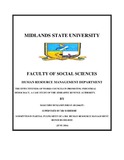Please use this identifier to cite or link to this item:
https://cris.library.msu.ac.zw//handle/11408/2179| Title: | The effectiveness of works councils in promoting industrial democracy :a case study of ZIMRA. | Authors: | Makumbe, Benjamin B. | Keywords: | Works councils, industrial democracy. | Issue Date: | Jun-2016 | Abstract: | This research was carried out to explore the effectiveness of works councils in promoting industrial democracy. It was carried out using the Zimbabwe Revenue Authority as a case study. The problem identified was the non-implementation of works council resolutions, which tainted the achievement of industrial democracy. It should be noted however that although there is no requirement at law for parties to reach agreements whenever they convene for meetings, both parties should be bound by the voluntary agreements that they make. Literature reveals that works councils have a positive impact and effectively result in industrial democracy in organizations, when the social partners negotiate in good faith and ensure successful implementation of works council agreements. This is because implementation of works council resolutions although not encompassed in industrial democracy has a strong impact on the process. On the conceptual framework, the Unitary and Pluralistic perspectives were adopted. More so the research constituted sixteen (16) participants, these were selected from a population of individuals knowledgeable of how works councils operate. Purposive non probability sampling was used in identifying the individuals used in the research. Questionnaires and interviews were used as research instruments in gathering data from the primary sources. Thematic analysis was used as a method of analyzing the findings from the research and data was presented using tables, summaries and matrixes. The major findings of the research were that non-implementation of works council resolutions was being caused by lack of resources, failure to negotiate in good faith by management and poor communication between management and labour. The findings also revealed that the non-implementation of the resolutions affect the trust of employees in works councils thereby affecting their effectiveness in promoting industrial democracy. The researcher concluded that implementation of works councils resolutions make works councils effective in promoting industrial democracy in organizations. The major recommendations were that negotiations should be done in good faith, strong communication should be enhanced between the two parties and that follow ups meetings should be put in place to ensure successful implementation of works council resolutions. This ensures that works councils become effective in promoting industrial democracy. | URI: | http://hdl.handle.net/11408/2179 |
| Appears in Collections: | Bsc Human Resource Management Honours Degree |
Files in This Item:
| File | Description | Size | Format | |
|---|---|---|---|---|
| MAKUMBE- DISSERTATION .pdf | Full text | 1.23 MB | Adobe PDF |  View/Open |
Page view(s)
620
checked on Jan 28, 2026
Download(s)
566
checked on Jan 28, 2026
Google ScholarTM
Check
Items in MSUIR are protected by copyright, with all rights reserved, unless otherwise indicated.



